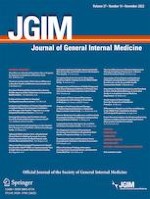Erschienen in:

04.04.2022 | Original Research
Developing the Expected Entrustment Score: Accounting for Variation in Resident Assessment
verfasst von:
Daniel P. Schauer, MD, MSc, Benjamin Kinnear, MD, MEd, Matthew Kelleher, MD, MEd, Dana Sall, MD, MEd, Daniel J. Schumacher, MD, PhD, MEd, Eric J. Warm, MD
Erschienen in:
Journal of General Internal Medicine
|
Ausgabe 14/2022
Einloggen, um Zugang zu erhalten
Abstract
Background
Clinical competency committees (CCCs) and residency program leaders may find it difficult to interpret workplace-based assessment (WBA) ratings knowing that contextual factors and bias play a large role.
Objective
We describe the development of an expected entrustment score for resident performance within the context of our well-developed Observable Practice Activity (OPA) WBA system.
Design
Observational study
Participants
Internal medicine residents
Key Results
Each individual resident had observed entrustment scores with a unique relationship to the expected entrustment scores. Many residents’ observed scores oscillated closely around the expected scores. However, distinct performance patterns did emerge.
Conclusions
We used regression modeling and leveraged large numbers of historical WBA data points to produce an expected entrustment score that served as a guidepost for performance interpretation.